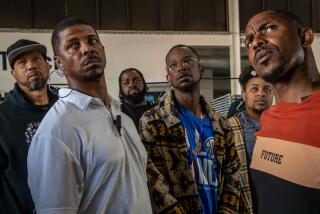Summer Jobs’ Extra Value : Teen-Agers Gain Self-Esteem, Independence, Money Skills by Working
While nations talk war in the Middle East, Molly Mazur learned how to make peace by working as a waitress.
“When people are fighting, that is just no good,” said the 17-year-old Orange High School senior, who works at Coco’s restaurant in Orange.
“Usually on my shift there’s eight to 10 waitresses, and if some of them have a problem with each other, then it makes it terrible,” Mazur said. “Because when people are fighting it doesn’t go as smoothly as it should. I’ve really learned how to try to make everyone happy.”
Low-paying, non-mentally taxing jobs such as waitressing have long been standard summer fare for teen-agers. Now, as the school year begins and teens spend six hours a day gazing out windows and thinking back on the past summer, many are realizing that those jobs have given them more than just a weekly paycheck.
Dr. Sheila Vaughn, a UC Irvine professor who teaches adolescent psychology and counsels young people, pointed out a few of the often overlooked benefits of teen-agers’ jobs.
“There’s just a lot of things that kids are supposed to be doing during adolescence,” Vaughn said, “that they get to do with a summer job--trying out different roles, getting some independence, building their self-esteem, and learning some real practical things like money handling.
“The jobs that you might think are mindless might not be mindless at all for someone who wanted to go into retail or a job dealing with children.”
Katie Teepe, 16 and an El Toro High School senior, spends about 25 hours a week as a customer service representative at the Wet Seal clothing and accessories store in Laguna Hills. She sees her job as a chance to practice skills useful for a career.
“What I really want to do is go into advertising, and what I really like is public speaking,” she said. “So this is kind of a different way of advertising--persuading people to buy things that fit their needs.
“You learn so much about customer service and about how to make something look better than it really is.”
Teepe, like Mazur, has also learned to cope with fellow employees. “You work there, and you’re not leaving, so you just have to learn to deal with all the different personalities who work there,” she said.
Jake Marvel, 17, learned a big lesson in dealing with diverse personalities while working at a day care center in El Toro this summer. With the help of nine other counselors, the senior and student body president at Mission Viejo High School worked 40 hours a week organizing activities for children ages 5 to 11.
“I learned a lot about patience and a lot about people and being in charge,” he said. “I found out that I could be the leader of the kids and the kids could still like me.”
Mazur, who has worked as a waitress about 15 hours a week since January, pointed out the importance of getting along with others while on the job. “A job is a lot different from your normal life where you can do whatever you want, say whatever you want, to anybody. Then, whatever you do just reflects on you. But whatever I do at work reflects on my job.”
She finds that her behavior is especially important when serving customers. “One of the most important things I’ve learned is how to deal with people in a tight situation. If something is wrong with their order or something’s wrong with the service, I’ve learned how to compensate for it, just by making the guests happy.”
Learning responsible behavior is one of the main benefits, Vaughn said, for a teen-ager with a summer job. “(Teens) learn what it means to be responsible--to fulfill their chores, to be there on time, to get themselves back and forth,” she said.
Katie agreed that her job has probably taught her to be more responsible. “When you get your schedule for work, it’s like everything else revolves around that schedule,” she said.
For Eric Brown, an 18-year-old senior at Santa Margarita High School, responsibility meant more than a cheery attitude, a clean uniform, or even getting to work on time. As a lifeguard this summer and last at Wild Rivers water park in Irvine, he had to protect people’s lives. “You can’t fall asleep on the job,” he said, “because anything can happen any time, anywhere.”
Job responsibilities, Vaughn said, can give teen-agers a boost of self-esteem. “They start to feel good about themselves if they see themselves succeeding, especially for an adolescent who doesn’t work hard in school.”
While Brown plays football and takes honors classes, he has special pride in his job skills, too. “You’re a professional when you’re a lifeguard,” he said. “You have special training. Before I worked here, I didn’t realize that lifeguards put in so many hours learning the job they had to do.”
His lifeguard training taught him first aid, life-saving techniques such as cardiopulmonary resuscitation, and how to deal with a panic-stricken person in the water.
“I learned that I could handle life-threatening situations and that I could think fast,” he said.
After breaking his leg playing football the last week in July, Brown moved from the pools to the office, where he picked up a few people-skills, too. “I learned how much work it takes to get people to come when people call in sick.”
Like much of Brown’s office work, Teepe’s job relies on her persuasive powers. She said that even though she makes extra money if she sells a certain dollar amount of clothes, she cannot tell a customer that an outfit flatters her if it does not. So, she has developed tact and the ability to think on her feet as she suggests different styles and sizes for indecisive patrons. She said she has learned how to use such lines as, “Well, personally, I like my jeans a little bit baggier” instead of “Those jeans are skintight and look gross.”
In this way, Teepe said, even working as a sales clerk in a clothing store has kept her mentally on her toes. She has also learned the physical demands of staying on her feet.
“When you see people in a clothing store, you don’t realize that they’re on their feet all day, eight hours a day, and they have to be friendly with people eight hours a day. (The sales clerk) can’t go in there with a bad attitude.”
Teepe learned another hard fact of the working world this summer: “You learn how to save your paycheck,” she said. Right now, she is saving for college spending money.
Vaughn said that however difficult it may be to save money, doing so makes teens feel good about themselves. “It gives them confidence. They think, ‘If I want something I can get it. If I want a car, I can save up money, and I can get a car.’ Jobs make adolescents feel more independent, which is really important.”
Besides giving teens responsibility, a chance to manage money and a sense of independence, summer jobs can challenge high school students in ways not available in a classroom.
Most summer jobs do not require the high-intensity training of lifeguarding, but almost all require some specialized skill or knowledge.
“Waitressing does take something of a strategy,” Mazur said. “It’s like playing checkers.” She has learned to juggle the time between courses, carry the plates so no food falls, and memorize details of customers’ orders.
While Teepe mastered the routine of waiting on customers within a week or so of starting her job, she is still learning about clothing fabrics and styles.
“You learn a lot about synthetic fabrics and about how they handle when they’re being washed and worn. That’s usually what the customer wants to know: ‘Is it going to shrink and will it fall apart after I wash it?’
“You learn a lot about new things coming out and about names for clothes that if you just walked into a store you wouldn’t be able to say, ‘Oh, that’s a baby doll (a shirt that flairs out at the bottom).’ Everyday I learn something new about a different style of clothing.”
In the day care world of real baby dolls, art projects and board games, Marvel said he picked up quite a bit of knowledge about children.
“I learned a lot about how much little kids are underrated,” he said. “People think they’re really stupid, but they’re not. I talked to a lot of bright kids that were fun to talk to.”
One of the tricks of dealing with children that he learned was to let them know the rules. Like any good elementary school teacher, he would spend the first day of each two-week session acting somewhat stern to show them who was in charge.
To teach rules, he said, “I would make examples of when kids got hurt, and I would find a rule that they had broken. I’d make up a rule if I had to, so that (the kids) would know they had done something wrong. But I also had to do it so I didn’t hurt their feelings. It’s a delicate balance.”


